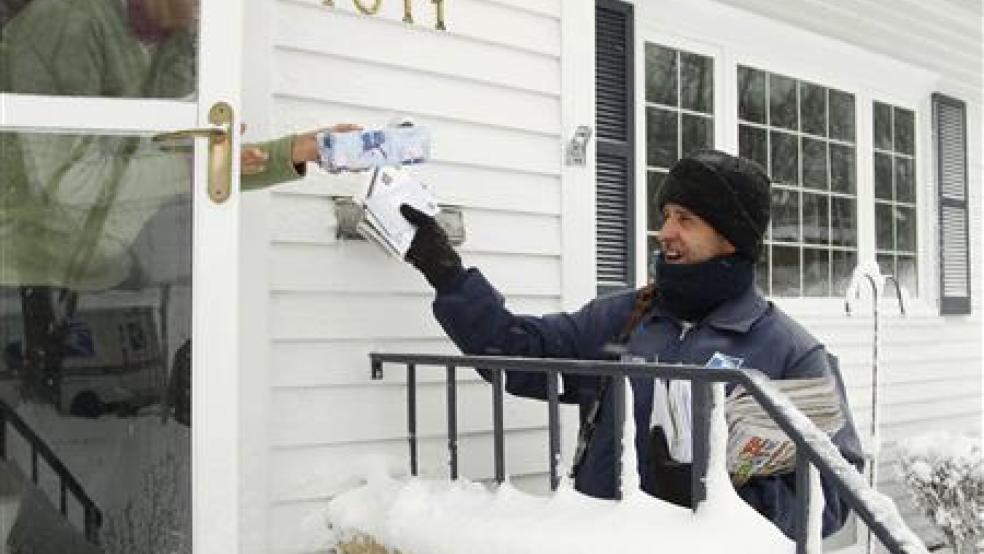WASHINGTON (Reuters) - The Postal Service plans to drop Saturday delivery of first-class mail beginning the first week of August, a move that the financially struggling agency said will save $2 billion annually.
The Postal Service is cutting costs aggressively as it grows increasingly frustrated that Congress is dragging its feet in authorizing a structural overhaul that could stabilize the agency.
The agency, which lost $16 billion last year, has blamed much of its recent troubles on a 2006 law that requires it to make massive payments into its future retirees' healthcare fund, as well as on reduced mail volumes as Americans increasingly turn to email and online communications rather than dropping a stamped letter in a postal box.
Some experts have previously estimated that the Postal Service could run out of cash by October.
However, ending Saturday mail delivery will not significantly stop the financial bleeding, and some critics said the move could backfire if customers become irritated by an erosion in service.
According to the plan, the mail agency will still deliver packages and prescription drugs six days a week and will not change post office operating hours. But it will not deliver direct mail or magazines.
The announcement comes just weeks after the USPS board of governors directed the agency to accelerate cost-cutting measures rather than wait "indefinitely" for legislation.
"The Postal Service is advancing an important new approach to delivery that reflects the strong growth of our package business and responds to the financial realities resulting from America's changing mailing habits," Postmaster General Patrick Donahoe said in a statement.
The 237-year-old institution ran up against its legal borrowing limit last year and defaulted twice on required payments to the federal government.
Postal officials have said for years that the agency needed to cut back on delivery days, as well as close underused facilities and reduce its workforce.
Lawmakers spent more than a year on postal legislation, including proposals to eliminate Saturday delivery, but were unable to agree on a bill.
"The choice is either changes to some of the services or raise prices, and people don't want prices raised," Donahoe said at a press conference.
Officials previously contended they needed permission from Congress to make the changes, but now believe they may be able to take some actions without new legislation.
GREETING CARD FIRMS OBJECT
No law requires that the Postal Service deliver mail six days a week, but Congress has included a provision in legislation to fund the federal government each year that has prevented the USPS from reducing delivery service. The current funding measure expires in March, and would free the Postal Service to change its delivery schedule unless Congress prohibits it in the next spending resolution.
The Postal Service is already facing some resistance to making delivery schedule changes without permission from Congress.
"Today's announcement by Postmaster General Donahoe to eliminate six-day delivery is yet another death knell for the quality service provided by the U.S. Postal Service," said Jeanette Dwyer, president of the National Rural Letter Carriers' Association.
Elijah Cummings of Maryland, the top Democrat on the House of Representatives' Oversight Committee, said delivery frequency should be determined by legislation "rather than through arbitrary action by the Postal Service."
But Representative Darrell Issa of California and Senator Tom Coburn of Oklahoma, both Republicans, called the change a common-sense move and noted President Barack Obama has supported allowing the Postal Service to move to five-day delivery.
Trade organizations that have a stake in Saturday mail deliveries such as the Greeting Card Association and National Association of Letter Carriers also expressed their disappointment.
George White, president of the Greeting Card Association, said the organization is concerned that this will drive down the number of greeting cards sent. More than 60 percent of greeting cards are delivered through the Postal Service, he said.
"Eliminating Saturday service is short-sighted and self-defeating. There are much better alternatives that will lead to a stronger Postal Service, without significantly and negatively impacting the citizen mailer," White said.
NALC president Fredric Rolando, said the plan was disastrous and would harm small businesses, rural communities, the elderly and the disabled. "We call for the immediate removal of the postmaster general, who has lost the confidence of the men and women who deliver for America every day," Rolando said via email.
Donahoe said the changes would allow the Postal Service to continue benefiting from the growing package delivery business as Americans order more products from websites such as eBay Inc and Amazon.com Inc.
Package deliveries were a bright spot in a bleak 2012 fiscal year, with package revenue rising 8.7 percent during the year.
(Additional reporting by Susan Heavey; Editing by Vicki Allen, Leslie Gevirtz, Karey Wutkowski and Jackie Frank)


